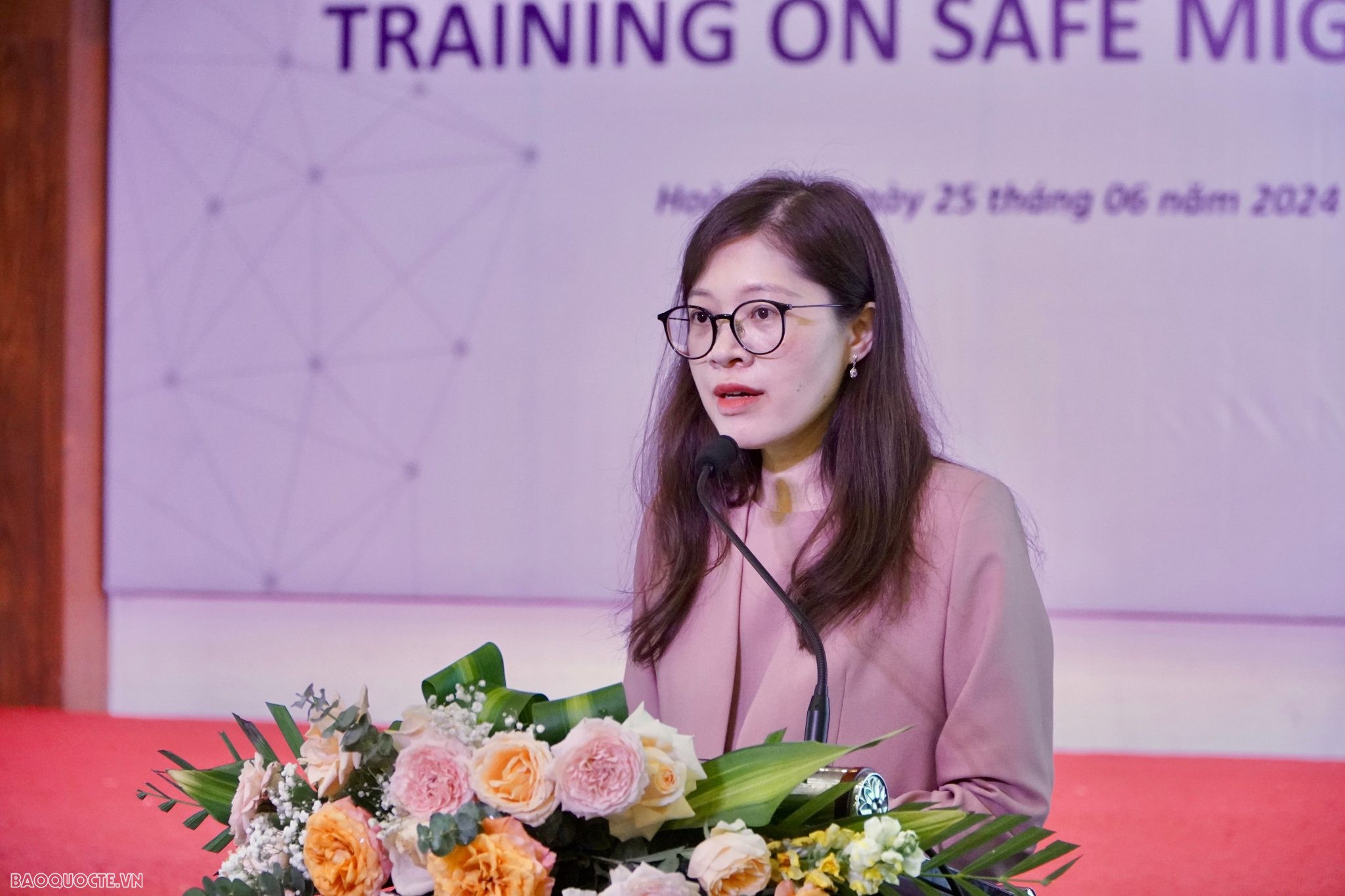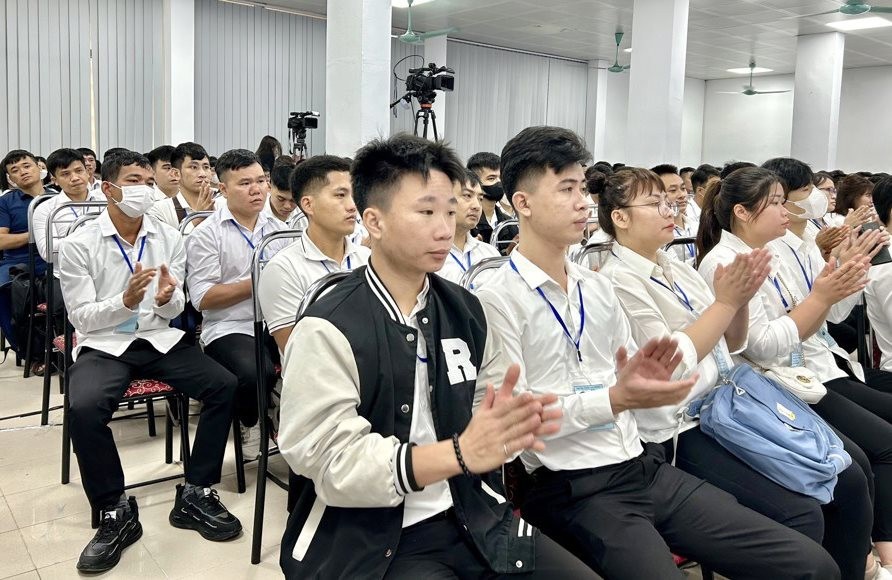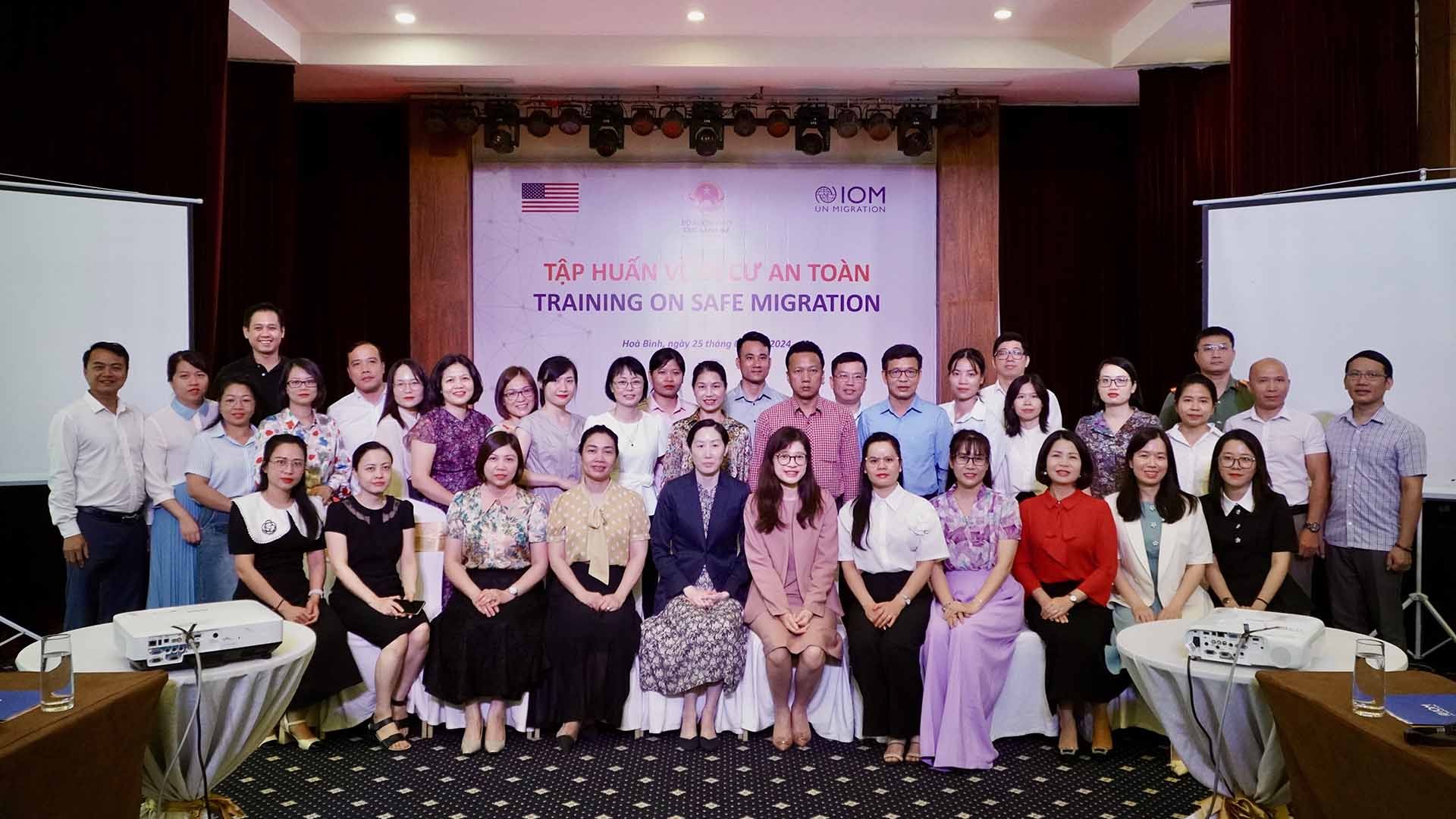
Ensuring safe and regular migration for Vietnamese citizens to avoid human trafficking traps
Latest
 |
| Deputy Director of the Consular Department Phan Thi Minh Giang speaks at training sessions on safe migration and the protection of Vietnamese citizens abroad in Hanoi on June 25, 2024. (Photo: Tuan Viet) |
On the sidelines of the training sessions on safe migration and the protection of Vietnamese citizens abroad (June 25-26, 2024) in Hanoi, Deputy Director Phan Thi Minh Giang answered an interview with The World & Vietnam Report about the protection of Vietnamese citizens abroad in the context of increasing online scams in Southeast Asia.
Could you share the difficulties and risks that Vietnamese workers often face when working abroad?
Currently, Vietnamese citizens work abroad in many forms: through service enterprises, organizations, individuals investing abroad; under Work and Holiday programs that Vietnam has signed with some countries, seasonal work programs, and cross-border labor cooperation at the local level with the Repulic of Korea and China. Additionally, there is a proportion of spontaneous workers, either in border areas or staying abroad via tourism routes.
During their time abroad, Vietnamese workers may encounter various difficulties and risks depending on their employment form and job type. The most noticeable challenges include language barriers, cultural differences, difficulties accessing health and social welfare services, and psychological issues due to separation from family and living alone abroad.
Additionally, workers may face risks such as confiscation of personal documents, discrimination, maltreatment, overtime work, accidents, non-payment of wages as per contract, unsafe working conditions, and being forced into illegal activities. For those working through informal channels, the risks are even higher.
Particularly, the situation of citizens being deceived into working at scam online establishments in Southeast Asia has recently highlighted these risks, severely infringing on the legitimate rights and interests of citizens, many of whom have become victims of crimes, particularly cybercrime, or have been trafficked.
 |
| The Center of Overseas Labor - Ministry of Labor, Invalids, and Social Affairs organizes a Korean language course to select workers for employment in the Republic of Korea. (Photo: Hanoi Moi) |
In response to the escalating exploitation of Vietnamese citizens at fraudulent online establishments, how is the protection and repatriation of Vietnamese citizens being handled?
Over recent times, the situation of citizens being taken to countries in Southeast Asia such as Cambodia, Laos, Myanmar, the Philippines (via Thailand) for forced labor at scam online establishments continues to evolve complexly.
According to a preliminary compilation by the Consular Department, from 2021 to now, about 4,000 citizens have been rescued, supported, and repatriated by Vietnamese diplomatic missions abroad; some cases have been identified as human trafficking victims.
In light of these circumstances, the Ministry of Foreign Affairs, along with Vietnamese diplomatic missions abroad, closely monitors the situation, intensifies information dissemination and warnings, and immediately conducts verification and rescue upon receiving information from domestic authorities, from family members, or through close collaboration with foreign and domestic authorities and related organizations to timely protect, support, and repatriate citizens.
Despite numerous difficulties in access and management, the efforts in this area have been actively and promptly implemented with a high sense of responsibility and, above all, a deep empathy for the suffering citizens have endured.
According to evaluations by the International Organization for Migration (IOM) and the International Criminal Police Organization (Interpol), this issue is becoming alarmingly global due to its close connections with various organized crime types along with the misuse of technology and artificial intelligence, requiring the cooperative responsibility of all nations.
Thus, within its scope, the Ministry of Foreign Affairs continues to enhance cooperation with countries in the region, calling for tight coordination in rescuing citizens at scam online establishments, identifying victims of human trafficking, and strengthening efforts to combat this type of crime.
What advice would you offer to Vietnamese workers preparing to work abroad and those already abroad facing emergency or crisis situations?
Workers intending to work abroad should thoroughly research the labor cooperation programs, enterprises providing the service of sending workers abroad advertised on the websites of the Department of Overseas Labor, the Center of Overseas Labor, the Ministry of Labor, Invalids, and Social Affairs, and local authorities.
Workers should be prepared not only in terms of skills and expertise but also in knowledge of Vietnamese and host country policies and laws, contract details, conduct, and issues related to preventing human trafficking and forced labor. This information is provided through orientation education courses.
Moreover, workers should proactively improve their foreign language skills and be aware of adhering to both Vietnamese and foreign laws. If issues arise while working abroad, workers should communicate and lodge complaints with their employers, enterprises providing the service of sending workers abroad, as well as labor cooperation focal agencies between Vietnam and the host country, requesting measures to ensure their rights and interests.
For those working abroad not through service companies, it is crucial to thoroughly understand the job content, anticipated workplace, contract conditions, benefits, and reliability of the contract and the person introducing the job before deciding to depart.
In cases of emergency and crisis, Vietnamese citizens in general, and Vietnamese workers abroad in particular, should immediately contact the Vietnamese diplomatic mission in the host country through the mission's hotline or the Citizen Protection Hotline of the Ministry of Foreign Affairs (+84 981848484), while also following the guidelines of the local authorities.
 |
| Delegates at the training sessions on safe migration and the protection of Vietnamese citizens abroad on June 25, 2024. (Photo: Tuan Viet) |
What should be done to promote safe migration in the future?
After the COVID-19 pandemic was controlled, the migration flows of Vietnamese citizens abroad have resumed and are increasing, especially in the field of contract-based overseas employment, with nearly 160,000 workers sent abroad in 2023.
Therefore, I believe that in the coming time, we need to continue implementing the following synchronized measures to create a safe and regular migration environment for citizens:
Firstly, intensify public communication of existing safe and regular migration channels, the risks of migration through informal channels, human trafficking, and the tactics of human traffickers, expand education on related policies and laws concerning migration, labor, and study abroad, targeting specific individuals, including those easily vulnerable, to enhance community and migrant awareness, especially those preparing to migrate abroad.
Secondly, enhance the management of residence and entry/exit, combat and prevent human smuggling and human trafficking activities, expand safe and regular migration channels with other countries, allowing migrants to choose regular l migration channels that suit them, as migration is a choice, not a necessity, thereby helping to prevent human smuggling and human trafficking.
Thirdly, improve inter-agency coordination, enhance general awareness and collective action in addressing migration issues and managing migration to promote the implementation of the United Nations Global Compact for Safe, Orderly, and Regular Migration (GCM) as per the plan issued by the Prime Minister on March 20, 2020.
Thank you!













